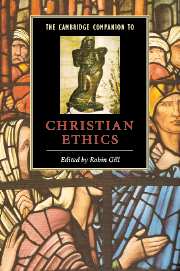Book contents
- Frontmatter
- Part I The grounds of Christian ethics
- Part II Approaches to Christian ethics
- Part III Issues in Christian ethics
- 12 Christianity and war
- 13 The arms trade and Christian ethics
- 14 Social justice and welfare
- 15 Ecology and Christian ethics
- 16 Business, economics and Christian ethics
- 17 World family trends
- 18 Christian ethics, medicine and genetics
- Select bibliography
- Index
13 - The arms trade and Christian ethics
from Part III - Issues in Christian ethics
Published online by Cambridge University Press: 28 May 2006
- Frontmatter
- Part I The grounds of Christian ethics
- Part II Approaches to Christian ethics
- Part III Issues in Christian ethics
- 12 Christianity and war
- 13 The arms trade and Christian ethics
- 14 Social justice and welfare
- 15 Ecology and Christian ethics
- 16 Business, economics and Christian ethics
- 17 World family trends
- 18 Christian ethics, medicine and genetics
- Select bibliography
- Index
Summary
John Elford's chapter has set the broad context of Christian approaches to war and of attempts over the centuries to establish just war criteria. In this chapter I will focus, instead, upon the arms trade (or, more accurately, international arms transfer) set in the specific context of the wars or conflicts in the 1990s, first in the Gulf, then in Iraq and finally in the Balkans.
Christian versions of just war theory are essentially attempts to limit the horrors of warfare rather than means of justifying particular wars. Although initially derived by Ambrose and Augustine from pre-Christian, Greek and Roman sources, as John Elford has shown, just war theory has long been shaped by Christian theologians and now represents one of the more abiding theological heirlooms in the modern world. It is intentionally a limiting framework. Given that countries are, and always have been, tempted on occasion to go to war, just war theory introduces notes of moral caution into a situation. It offers broad criteria in order to encourage people to see some forms of warfare as considerably less justified than others. Down the centuries many Christians have voiced strong anxieties about warfare and have sought to constrain countries from going lightly into battle and then to limit the horrors of war once it starts.
- Type
- Chapter
- Information
- The Cambridge Companion to Christian Ethics , pp. 183 - 194Publisher: Cambridge University PressPrint publication year: 2000



